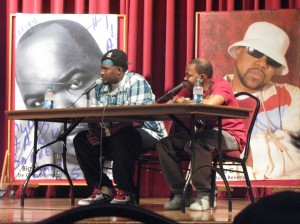
Lanetta Dickens is majoring in English and minoring in African American Studies. She served as an intern in Special Collections during Spring 2012, working on preservation of the DJ Screw Sound Recordings and assisting with the exhibition DJ Screw and the Rise of Houston Hip Hop.
Awready! The Houston Hip Hop Conference, presented by the University of Houston Libraries, the HERE Project at Rice University, African American Studies at UH, and the Cynthia Woods Mitchell Center for the Arts at UH, was a recent set of events honoring DJ Screw. I attended the Grafitti, B-Boy and B-Girl Exhibition opening, and the panels/presentations of A Screwed Up History. The art show showcased local Houston artists and their artwork in original display. The event was a success, with free food and fun entertainment.
The panelists involved in the conference were knowledgeably aware of DJ Screw and the Screwed Up Click (S.U.C.). Participants on the panels included rappers, artists, writers and scholars who informed the audience about the history and culture of Hip Hop in Houston. One of the scholars, Dr. Ronald J. Peters, Associate Professor of Public Health at the University of Texas Health Science Center, managed a discussion on the effects of syrup with rapper ESG and DJ Lil’ Randy of the S.U.C. The topic was first introduced with a definition of the drug, how rappers and individuals were using it, and the results of using the drug.
“Syrup” is a recreational drink based on prescription cough syrup made with codeine promethazine. Both S.U.C. members considered syrup an addictive drug, the use of which was a secretive act initially. However, due to the spread and popularity of syrup, consequences soon emerged, and law enforcement began investigating the drug. Lil’ Randy and ESG expressed their feelings and reactions, saying that they were somewhat surprised by the spread of its popularity. This type of information about the evolving culture of hip hop is important for understanding the African American community and the individuals who have shaped that community.
The Hip Hop conference was an experience that I will remember for a lifetime. I was enlightened by the conversations and discussions that were associated with the growing music empire. As a minor in African American Studies, I have learned to appreciate and acknowledge the Hip Hop culture that has extended throughout the world. Hip Hop has made a contribution to our society as a means of expressing and documenting the truth about ourselves.
